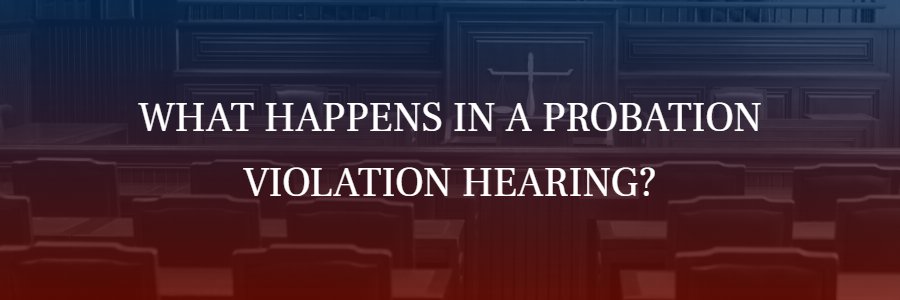What Happens in Probation Violation Hearing?
Posted in Criminal Defense on March 26, 2020
If you have been convicted of committing a crime, there is generally some form of punishment attached. This may include jail or prison time, but it also may include probation. Probation is the release of an offender from detention, subject to a period of supervision by law enforcement. Sometimes a person is released from incarceration into probation, and sometimes a person is given probation in lieu of incarceration. However, when an offender violates the terms of their probation, they can face serious consequences.

There are various ways that probation can be violated. In general, a probation violation occurs when an offender ignores, refuses, avoid, or otherwise breaks the terms and conditions of their probation. Some of the most common ways that probation is violated includes:
- Not appearing for a scheduled court appearance.
- Failing to report to the probation officer at the scheduled time.
- Not Paying any fines or restitution fees.
- Visiting certain people or places that are off-limits.
- Traveling out of state without permission.
- Possessing, using, or selling illegal drugs.
- Committing another crime.
A violation may result in an immediate arrest by the probation officer. However, many probation officers may choose to give a warning to the person in violation instead of arresting them. State probation officers could request that a probation violator appears in court, at which time the probation officer will request a penalty.
What happens in the courtroom?
When considering whether or not a violation of probation has occurred, and whether or not to revoke a person’s probation, a judge will follow a two-step process.
- A judge must first determine whether or not there is probable cause to revoke a person’s probation. The judge will examine the report and testimony of the arresting officer. If a judge finds that there is probable cause to support probation violation, they may issue a warrant for the violator’s arrest (or detain the violator if they are present). This will “summarily” revoke a person’s probation, though this is not a formal revocation. This is a temporary probation suspension, pending a formal probation revocation hearing.
- The next step is the formal probation revocation hearing. At this hearing, a judge will consider the terms of the probation and examine the conduct that has allegedly occurred. If a violation is found, the judge will consider various factors to determine the appropriate punishment.
What penalties do I face if I violate my probation?
Judges have considerable leeway when determining punishment for probation violation cases. Some of the possible outcomes could include:
- Incarceration as a condition of reinstatement. The judge may order that the violator serve some time in jail and then continue with their original probation terms and conditions.
- Impose the original sentence. If a violation was serious enough, a judge may impose the sentence the violator originally received for the crime that they are on probation for.
- Additional probation conditions. A minor technical violation of probation may result and the judge imposing new conditions on the probation, including extending the probation or adding additional terms, such as community service or the installation ignition interlock device (for DUI cases).
Do I need a lawyer?
It is always a good idea to have an attorney by your side when you are facing the possibility of jail time or stringent probation terms and conditions. At the Law Offices of Graham Donath, APC, our qualified and experienced criminal defense attorneys will be ready to examine your entire case. We will stand by your side for every probation violation hearing and work to secure the best terms possible for your situation. You can contact us for a consultation on your case by clicking here or by calling as soon as possible.

